Last Updated on September 14, 2021
Brake pads are found in cars, trucks, SUVs, and even motorcycles. They are what create friction against the disc brake rotors of your vehicle. This happens every time you step on the brake pedal and this friction allows the vehicle to slow down and stop.
Because of the amount of times we step on the brake pedal, it naturally creates a lot of regular wear and tear on the brake pads. Since brake pads can vary quite a bit as far as performance, longevity, noise, dust, and price, the best brake pads for one vehicle may not necessarily be the best for another.
Before we get into our list of top 5 best brake pads, it’s important to understand the three main types of brake pad materials out there. They are not created equal and each have their own advantages and disadvantages.
See Also: 16 Tire Manufacturers (Ranked Best to Worst)
Types of Brake Pads
When brake pads do their job, they turn the kinetic energy of a moving vehicle into thermal energy (a lot of heat), so the pads must be made of a material that dissipates heat well. Older vehicles used asbestos to make brake pads due to its superior ability to rid itself of heat.
Of course, we now know that asbestos can cause severe illness when the dust is inhaled, so alternatives quickly became the norm. Here are the three main brake pad materials in use today.
Related: How to Measure Brake Pad Thickness
Metallic/Semi-Metallic

Metallic brake pads, sometimes called semi-metallic pads, are made of a mixture of materials such as steel, iron, graphite, and copper held together with an organic resin.
They are quite tough, so usually the rest of the brake system wears before the pads do. Using these may wear your rotors faster than you’d like.
Metallic pads are used in most vehicles because there is a great cost to benefit ratio. These cost-effective parts really shine when they’re used to stop heavy vehicles, though they’re great for road cars as well.
These are sometimes used in performance driving and work well as long as the car has ample time to warm up since the material works much better when it’s warm.
Ceramic

Synthetic or ceramic brake pads are made of mostly ceramic with some filler material held together by a bonding compound. These are great for aggressive driving as the ceramic dissipates heat very well and they wear slowly.
It’s very important for brake pads to dissipate heat effectively since overheated pads don’t work well, if at all. Each pad material is carefully manufactured to have the right friction coefficient so if the temperature is outside the intended range the material behaves differently. The temporary loss of braking ability due to overheating is called brake fade.
Along the many benefits, ceramic brake pads have the highest cost. For most drivers, the expense doesn’t justify the gain in performance.
This material takes longer to warm up to optimal operating temperature so it may actually not be best for a daily driver. Stopping distance will increase when brake pads are operated outside their intended heat range, even if it’s because the pads are too cold.
Organic

Organic, or non-metallic, brake pads are generally the softest (and thus have a short lifespan). They are often made of glass, rubbers, and resins mixed with a bit of metal fibers.
Sometimes Kevlar, a very strong organic material, can be mixed into these pads for increased durability, though the price tag reflects the improvement.
Organic pads reduce the amount of pollution from brake dust and are easy to dispose of. This makes them favorable for vehicles that don’t have high braking demands.
Related: Ceramic vs Organic Brake Pads
Top 5 Best Brake Pads
Now that you know about the types of brake pads available, the next is to look at the best brake pad brands currently available. Below are the top ranked brake pad manufacturers for cars, SUVs, and trucks along with a link to a popular model of each.
You will likely need to search Amazon or online auto parts sites for the specific size to fit your vehicle.
#1 – Akebono
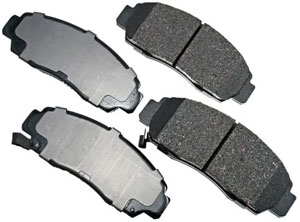 These Japanese brake pads are suitable for not only trucks and cars, but motorcycles and scooters as well. Some high-end vehicles you might find them in include Audi, BMW, and Mercedes (even AMG).
These Japanese brake pads are suitable for not only trucks and cars, but motorcycles and scooters as well. Some high-end vehicles you might find them in include Audi, BMW, and Mercedes (even AMG).
They offer a fantastic combination of stopping power, longevity, and low brake dust making them a popular option in the mid-price range.
Example: Akebono ACT787 Ceramic Brake Pads
#2 – Wagner
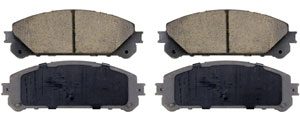 Wagner is one of the oldest and highly respected brake part manufacturers around. They offer a long life, quiet operation, low brake dust, and good stopping power making them fantastic all-around brake pads.
Wagner is one of the oldest and highly respected brake part manufacturers around. They offer a long life, quiet operation, low brake dust, and good stopping power making them fantastic all-around brake pads.
Pretty much any set of Wagner ceramics will be a nice upgrade over your stock brake pads.
Example: Wagner ThermoQuiet QC1324 Ceramic Brake Pads
#3 – StopTech
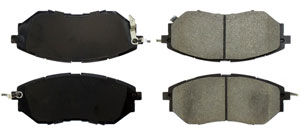 StopTech brake pads offer some of the best performance on the market making them a good choice when you need to slow down quickly such as spirited driving through windy, isolated roads, autocross, or track days. It’s no wonder many police cruisers use StopTech brake pads.
StopTech brake pads offer some of the best performance on the market making them a good choice when you need to slow down quickly such as spirited driving through windy, isolated roads, autocross, or track days. It’s no wonder many police cruisers use StopTech brake pads.
Heavier vehicles such as trucks and SUVs will also benefit from these pads since stopping that much weight can be a challenge for other brands. They are known to cover your wheels with brake dust quicker than other brands so if keeping your wheels clean for long stretches is an issue, another brand might be a better option.
Example: StopTech 309.10780 Metallic Brake Pads
#4 – Bosch
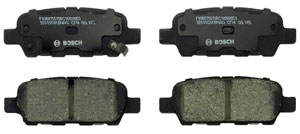 Bosch is a well-known German brand but they make brake pads for almost every vehicle. It’s a popular brand with owners of Audi, Nissan, Toyota, and Lexus cars.
Bosch is a well-known German brand but they make brake pads for almost every vehicle. It’s a popular brand with owners of Audi, Nissan, Toyota, and Lexus cars.
Their popular QuietCast series offers excellent stopping power along with quiet operation while producing only small amounts of brake dust.
Example: Bosch BC905 QuietCast Ceramic Brake Pads
#5 – AC Delco
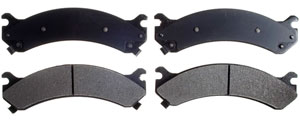 If you want an affordable replacement brake pad option, it’s hard to beat AC Delco. Known for their low dust, almost zero noise, and good performance, AC Delco pads are one of the best values around. They are especially popular with owners of GM trucks and SUVs but are a good option for almost any vehicle.
If you want an affordable replacement brake pad option, it’s hard to beat AC Delco. Known for their low dust, almost zero noise, and good performance, AC Delco pads are one of the best values around. They are especially popular with owners of GM trucks and SUVs but are a good option for almost any vehicle.

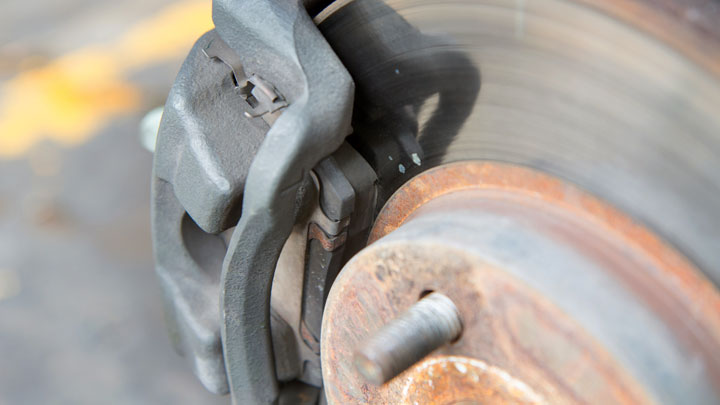
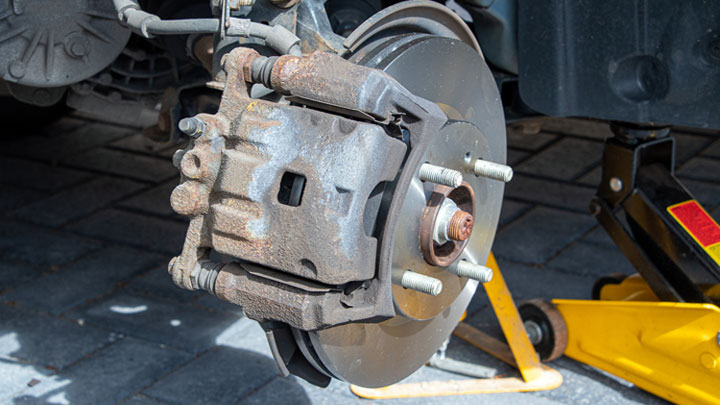
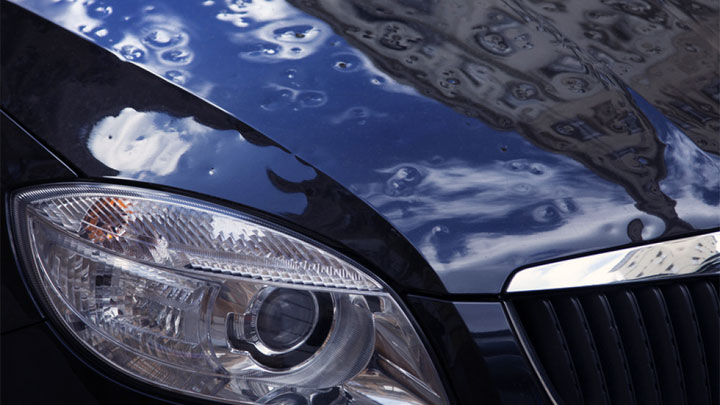

I have been an automotive engineer for over 40 years. I learned the hard way about budget and premium brake pads. I will not fit anything but oe or premium quality pads. We don’t have the range of pads in NZ that you have overseas but I have always fitted the best that I could